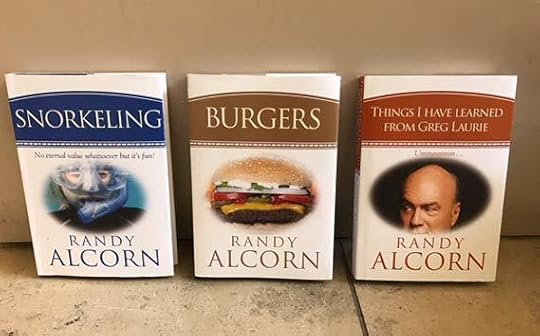Randy Alcorn's Blog, page 134
May 3, 2017
Real Love Encourages Others to Do the Right, Most God-Glorifying Thing

To sin is to break relationship with God. Therefore, sin is the biggest enemy of happiness, and forgiveness its greatest friend. Confession reunites us with the God of happiness.
If we believe that sin is never in our best interests, it will clarify many otherwise hard decisions in which we imagine we must choose between helping people do right and helping them be happy. It will also help us understand what true, Christlike love looks like.
Responding to a post I shared, a woman wrote on my Facebook page about how she felt a real friend would help someone seeking an abortion: “Jesus would hold your hand as you walk through the angry, non-love-displaying mob; wait for you while you got the procedure; and drive you home to make sure you were safe/be a listening ear.”
I had a similar conversation with a young woman who believed that abortion takes the life of an innocent child, yet nonetheless told me that because she loved her friend, she was going to drive her to the clinic to get an abortion. She said, “That’s what you do when you love someone, even if you disagree.”
I asked, “If your friend wanted to kill her parents and had a shotgun in hand, would you drive her to her parents’ house?”
“Of course not.”
But other than legality, what’s the difference? It’s never in a mother’s best interest to kill her child—it will ultimately take from her far more happiness than it brings. Too often, in the name of love, we assist people in taking wrong actions which, because they are wrong, will rob them of happiness. We may congratulate ourselves for being “loving,” but what good does our love do them if it encourages their self-destruction?
Years ago, when she was in high school, one of my daughters had a friend who found herself pregnant and was determined to get an abortion. My daughter, along with an older friend, showed up outside the clinic at the time of the appointment and pleaded with her friend and her friend’s mom to save the life of her baby. She offered help and support, including free babysitting. But sadly, the friend went through with the abortion. (Though this was obviously difficult, later my daughter heard from someone else that her friend actually respected her for doing what she did.) So encouraging others to do the right thing doesn’t always mean they’ll do it, or that they will like you. But even then, real love doesn’t quit or give up; it will offer help and point to Jesus Christ as the only true source of healing and forgiveness.
Ephesians 4:15 tells us to speak the truth in love, not to withhold the truth in love. We should be full of grace and truth, as Jesus was and is (John 1:14). “Hate the sin, but love the sinner.” No one did either like Jesus.
Kevin DeYoung put it this way about real, Christlike love:
Christ is our substitute and our example. And with Christ as our example, our command is this: we ought to lay down our lives for our brothers. This is why love is so much more difficult than the bumper stickers make it out to be. It requires so much more than a general sentiment of good will. It is so much deeper and better than unconditional affirmation.
What does unconditional affirmation require of you by way of sacrifice? Nothing. All it requires is a wave of the hand—“Whatever you do, I’m fine. However you live, that’s fine.” The problem with unconditional affirmation is not that it is too lavishly loving, but that it is not nearly loving enough. When God tells us to love our brothers he means more than saying, “I’m okay. You’re okay. Whatever you do is fine and I don’t judge.” To really love your brother is to lay down your life for him. It requires you to die to yourself, which may mean a sacrifice of your time, a sacrifice of your reputation, and a sacrifice of your comfort. Unconditional affirmation only asks that you sacrifice your principles.
Love is harder than we think. Of course we love our kids and grandkids and those who treat us well. We love nice people. But Jesus says even the pagans do this. That’s not hard. People love people who love them. But will we keep on loving when it means bearing burdens we would rather not be bothered with? Will we love when the people we love do not love us in return? Will we lay down our lives for those who are unlovely, undeserving, ungrateful?
Isn’t that what Christ did for us? When we were unlovely and undeserving and ungrateful, Christ died for us. He loved us not because we were holy, but so that we might be holy. His love was self-sacrificing, sin-atoning, and life-transforming.
He loves us with a love the world does not understand. And it is so much better than unconditional affirmation.
For more on speaking the truth in love, see Randy's book The Grace and Truth Paradox, as well as the devotionals Grace and Truth.
Photo: Unsplash
May 1, 2017
God’s Truth Is as Relevant and Vital as Ever

In a world of clashing claims and competing worldviews, where our own feelings and circumstances change from day to day, nothing is more important than God’s truth. Given some of the books and movies that countless Christians are reading and viewing, and the growing biblical illiteracy, churches are extremely vulnerable to false doctrine. God’s truth is needed to ground and guide us.
When we wonder what’s right, we’re to turn to God’s Word: “For the word of the Lord is right and true” (Psalm 33:4). As Psalm 119 depicts in every one of its 176 verses, God’s truth is at the heart of the spiritual life. It’s real, life-giving, and able to transform.
My new devotional book, Truth: A Bigger View of God's Word, offers 200 brief daily meditations, Scriptures, and inspirational quotes that will enable you to grasp more fully the TRUTH of God’s Word. It contains reflections not only on the general topic of truth, but also on many facets of truths found in Scripture, including eternity, purity, holiness, and happiness. Given the remarkable erosion of belief in God’s Word that is pervasive now even among many evangelical churches, the book is more timely than it would have been thirty years ago.
I’m pleased with how Truth turned out and hope you enjoy it as well. Below is a sample entry:
“Great and marvelous are your deeds, Lord God Almighty. Just and true are your ways, King of the nations” (Revelation 15:3).
The times we live in are in no danger of going down in history as “The Era of Deep Thought.” In our world, feelings overshadow thinking and sizzle triumphs over substance.
In this shallow culture, how can we keep from turning into trivial Christians? “Reflect on what I am saying,” Paul wrote, “for the Lord will give you insight into all this” (2 Timothy 2:7).
When we invest in understanding God’s truths, we become people of depth and substance. If you want depth, you have to behold God’s truth often, allowing it to make the crucial sixteen-inch journey from your head to your heart.
“The quality of a Christian’s experience depends on the quality of his faith, just as the quality of his faith depends in turn on the quality of his understanding of God’s truth.” —Os Guinness
(You can also download a longer excerpt to get more of the flavor of the book.)
Eternal Perspective Ministries is giving away 10 copies of Truth.
April 28, 2017
10 Questions to Help Us Analyze Our Smartphone Habits

On his blog, Tony Reinke interviewed author and podcaster Alastair Roberts about smartphones and how they change us. Alastair shared ten helpful questions to help us think through whether our personal smartphone habits are healthy, or need adjustment. He writes:
Do our particular uses of our smartphones, and our use of a smartphone more generally, have the actual effect—not just hold the theoretical possibility—of making us better servants of God and of our neighbors? Are our smartphones tools that facilitate our commitment to the central purposes and values of our lives, or are they—and our habitual modes of using them—constantly distracting, diverting, or obstructing us from them?
More specific diagnostic questions could include such as the following:
Is my smartphone making it difficult for me to give the activities and persons in my life the full and undivided attention and self-presence that they require and deserve?
Do I habitually use my smartphone as an easy escape and distraction from the difficult task of wrestling through the experience of lack of stimulation and boredom to the rewarding reality of true engagement?
Is my smartphone use squeezing out my inner life, encroaching upon time that would otherwise be given to private contemplation, reflection, and meditation? Do I use it as a way to distract myself from unsettling truths and realities that can slowly come into focus in moments of silence and solitude?
Am I using hyper-connectedness to substitute a self unthinkingly immersed in a shallow and amniotic communal consciousness and its emotions, for the difficult task of developing my own judgment, character, disciplines, resolve, and identity?
Are my uses of my smartphone arresting and hampering my processes of deliberation and reflection, encouraging reactive judgments and premature decisions?
Is my use of my smartphone mediating my relationship with and understanding of myself in unhealthy ways?
Is my smartphone a tool that I use, or has it fettered my attention and time to other persons and activities that are wasteful and overly demanding of them?
Are my uses of my smartphone preventing me from developing and maintaining healthy patterns and routines in my life, disrupting my sleeping patterns, interrupting my concentration upon my work, habituating me to the fragmentation of my time and attention?
Is my smartphone usage consuming time that I used to or could potentially devote to worthier activities? Do I use my smartphone to ‘kill time’ that I could otherwise fill with prayer, reading, writing, edifying conversation, face-to-face interactions, etc.?
Are my uses of my smartphone conducive to the faithfulness and freedom of others? Am I using my smartphone in ways that create unhealthy demands and pressures upon them?
By the way, Tony Reinke, one of my favorite authors, has a new book out titled 12 Ways Your Phone Is Changing You. Here’s more about it:
Drawing from the insights of numerous thinkers, published studies, and his own research, writer Tony Reinke identifies twelve potent ways our smartphones have changed us—for good and bad. Reinke calls us to cultivate wise thinking and healthy habits in the digital age, encouraging us to maximize the many blessings, avoid the various pitfalls, and wisely wield the most powerful gadget of human connection ever unleashed.
Check out the trailer for the book:
Photo: Unsplash
April 26, 2017
John Piper, George Mueller, and The Pleasures of God

Since reading John Piper’s book Desiring God the month it came out in 1986, I became interested in everything he writes. In 1991, the year after we started Eternal Perspective Ministries, he came out with The Pleasures of God, which was updated in 2000. This is a truly great book that I highly recommend. Here’s a portion I want to share with you.
Behold, I create new heavens and a new earth…I create Jerusalem a rejoicing, and her people a joy. (Isaiah 65:17-18, RSV).
I will give them one heart and one way, that they may fear me for ever, for their own good and the good of their children after them. I will make with them an everlasting covenant, that I will not turn away from doing good to them; and I will put the fear of me in their hearts, that they may not turn from me. I will rejoice in doing them good, and I will plant them in this land in faithfulness, with all my heart and with all my soul. (Jeremiah 32:39-41).
On February 6, 1870, George Mueller’s wife, Mary, died of rheumatic fever. They had been married thirty-nine years and four months. He was sixty-four years old. Shortly after the funeral he was strong enough to preach a “funeral sermon” as he called it. What text would he choose when God had taken his best beloved? He chose Psalm 119:68, “You are good, and do good.” His three points were:
The Lord was good, and did good, in giving her to me.
The Lord was good, and did good, in so long leaving her to me.
The Lord was good, and did good, in taking her from me.But the promise is greater yet. Not only does God promise not to turn away from doing good to us, he says, “I will rejoice in doing them good” (Jeremiah 32:41). “The Lord will again take delight in prospering you” (Deuteronomy 30:9). He does not bless us begrudgingly. This is a kind of eagerness about the beneficence of God. He seeks us out, because it is his pleasure to do us good. God is not waiting for us, he is pursuing us. That, in fact, is the literal translation of Psalm 23:6, “Surely goodness and mercy shall pursue me all the days of my life.”
…God is like a great Niagara—you look at it and think: surely this can’t keep going at this force for year after year after year. It seems like it would have to rest. Or it seems like some place up stream it would run dry. But, no, it just keeps surging and crashing and making honeymooners happy century after century. That’s the way God is about doing us good. He never grows weary of it. It never gets boring to him.
God has overcome every obstacle that would keep him from lavishing kindness on us forever.…Christ was bruised to bear the condemnation that stood like a dam between the desert valley of our lives and the trillion-ton, cool, clear, deep, fresh-water reservoir of God’s goodness.
He carried our griefs and bore our sorrows and triumphed over death “so that in the coming ages he might show the immeasurable riches of his grace in kindness toward us in Christ Jesus” (Ephesians 2:7). The Watergates of the dam are opening wider and wider—up to our ability to bear the blessing of God’s glory.
His exuberance in delighting in the welfare of his servant is the measure of the immensity of his resources: “My God will supply all your needs according to his riches in glory in Christ Jesus” (Philippians 4:19). For the Lord takes pleasure in his people; he adorns the humble with victory (Psalm 149:4).
God says his joy over his people is like a bridegroom over a bride. He is talking about honeymoon intensity and honeymoon pleasures and honeymoon energy and excitement and enthusiasm and enjoyment. He is trying to get into our hearts what he means when he says he rejoices over us with all his heart.
And add to this, that with God, the honeymoon never ends. He is infinite in power and wisdom and creativity and love. And so he has no trouble sustaining a honeymoon level of intensity; he can foresee all the future quirks of our personality and has decided he will keep what’s good for us and change what isn’t; and he is infinitely creative to think of new things to do together so that there will be no boredom for the next trillion ages of millenniums.
The Lord, your God, is in your midst, a warrior who gives victory; he will rejoice over you with gladness, he will be quiet in his love; he will exult over you with loud singing. (Zephaniah 3:17).
I say this is almost too good to believe—that when the father calls the minstrels to sing at the banquet, it is he himself that leads the singing, and the song has to do with how glad he is that we are there. In fact, it is too good for some people to believe, and they, tragically, cannot believe it. But Zephaniah labors under the wonderful inspiration of God to overcome every obstacle that would keep a person from believing—really feeling and enjoying—the unspeakable news that God exults over us with singing.
I ask “Can you feel the wonder of this today—that God is rejoicing over you with loud singing?”
“No,” you say, “I can’t, because I am too guilty. I am unworthy. My sin is too great, and the judgments against me are too many. God could never rejoice over me.”
But I say, “Consider Zephaniah 3:15. God foresees your hesitancy. He understands. So his prophet says, ‘The Lord has taken away the judgments against you!’ Can you not feel the wonder that the Lord exults over you with loud singing today, even though you have sinned? Can you not feel that the condemnation has been lifted because he bruised his own Son in your place, if you will only believe?”
“No,” you say, “I can’t, because I am surrounded by enemies. Obstacles press me in on every side. There are people at work who would make my life miserable if God were my treasure. There are people in my family who would ostracize me. I have friends who would do everything to drag me down. I could never go on believing. I would have too many enemies. The oppression would be too much to bear, I could never do it.”
But I say, “Consider Zephaniah 3:17, ‘The Lord is a warrior who gives victory’; and verse 19, ‘Behold, at that time I will deal with your oppressors [says the Lord]’; and verse 15, ‘He has cast out your enemies.’ Can you feel the wonder that God is doing everything that needs to be done for you to enjoy his own enjoyment of you? Can you see that the enemies and the oppressors are not too strong for God? Can you feel the wonder of it now? Can you believe that he rejoices over you?”
“No,” you say, “still I can’t, because he is a great and holy God and I feel like he is far away from me. I am a nobody. The world is a huge place with many important people. There are major movements and institutions that he is concerned with and happy about. I am too small. God is like the president. He is far away in Washington, busy with big things.”
But I say, “Consider Zephaniah 3:15, ‘The king of Israel, the Lord, is in your midst’; and verse 17: ‘The Lord, your God, is in your midst.’ He is not far from you. Yes, I admit that this staggers the imagination and stretches credibility almost to the breaking point—that God can be present personally to everyone who comes to him and believes on him. But say to yourself, again and again, He is God! He is God! What shall stop God from being close to me if he wants to be close to me? He is God! He is God! The very greatness that makes him seem too far to be near, is the greatness that enables him to do whatever he pleases, including being near to me. Has he not said, for this very reason, ‘I dwell in a high and holy place, and also with him who is of a contrite and humble spirit’ (Isaiah 57:15)? Can you not then feel the marvel that God makes merry over you—even with loud singing—when you come to him and believe him?”
Excerpts from John Piper, The Pleasures of God: Meditations on God’s Delight in Being God (Sisters, OR: Multnomah Publishers, 2000).
Photo: Unsplash
April 24, 2017
Will There Be No More Sunrises or Sunsets on the New Earth?

Some people wonder, “If the New Earth will be full of the light of God, does that mean we won’t see any more sunrises and sunsets?” Do you love sunrises and sunsets? Are you disappointed to think you might not see any again? Our sun is one of countless billions of suns. I think we’ll see many more sunrises and sunsets, on many worlds. And when we’re watching one of those spectacular sunrises, I don’t think we’ll wonder, What am I missing?
Revelation 22:5 says, “There will be no more night.” Some people believe this is figurative, speaking of the moral perfection of the New Earth. Darkness is associated with crime, evil done under cover of night. Darkness is synonymous with distressed travelers unable to find their way. Prostitution, drunkenness, and idol worship often happened at night. In the modern era of electric lights, it’s difficult to understand the utter dread of traveling in the dark and the threat of being locked out of the city gates that would close at night to prevent robbers, bands of marauders, or enemy soldiers from invading a city. To be outside the city at night was to be exceedingly vulnerable. This will no longer be.
Yet darkness isn’t evil—God created it before the Fall (Genesis 1:5). Night is also associated with positive things: time with family after a hard day’s work, opportunity to talk, rest, have dinner with loved ones, read Scripture, and pray.
Because God created the first celestial heavens to display His glory (Psalm 19:1), when He makes the new celestial heavens, they will perform this mission even better. That means we’ll have to be able to see them. If that requires darkness, as it does now, then darkness we will have, if not on Earth, then somewhere from which we can behold God’s glory in the new heavens.
I’m speculating, but I don’t believe these passages demand constant and unvarying brightness, certainly not outside the New Jerusalem. There may be diffused light or twilight, without total darkness. Light may be constant in the Holy City but not necessarily in the cities and countries outside the city gates.
To view the new heavens, we might travel to the far side of the moon and other places where stargazing is unhindered by light and atmospheric distortion. Imagine the quality of telescopes that redeemed minds will design and build. We may be able to visit innumerable planets from which the wonders of the night sky can be viewed to the praise and glory of God.
How will our eyes be able to tolerate the bright light of the New Jerusalem? Our new bodies will be stronger than our present ones. We’ll be designed for our highest purpose, to see God’s face—brighter than the sun—without being blinded. Rather than turn away from that Light, we’ll be drawn to it.
For more answers to questions about eternity, see Randy's book Everything You Always Wanted to Know About Heaven as well as his comprehensive book Heaven.
Photo: Unsplash
April 21, 2017
Why I Love to Read

This Sunday, April 23 is World Book Day, a global celebration of reading, authors, and books, recognized in over 100 countries worldwide.
Books and bookstores have had an enormous influence on my own life. My first youth pastor did me a huge favor—he gave me a key to his office, so I could go in any time and read his books, hundreds of them. I read everything I could get my hands on. There was an elderly couple in our church who had a Christian bookstore in their house in Gresham, Oregon, my hometown. I would go there several days a week, for hours at a time. They would point out books for me to read. They introduced me to Lewis, Schaeffer, and Tozer, and books such as Tortured Wonders, God's Smuggler, Through Gates of Splendor, and The Cross and the Switchblade.
Over the years I've bought and read portions or all of thousands of books. Ultimately, loving to read has helped me become a better writer. Our worldviews permeate our writing, and if all we soak in is popular culture, a few hours a week at church won’t be sufficient to give us depth and durability. We need to read quality books by great Christian thinkers. I cannot divorce God’s works of grace in my life from good books! (In this excerpt from my book Heaven, I talk about books the Bible says are now in Heaven, and I give arguments for believing other books will be written and read on the New Earth.)
And of course, no book is more important than the Bible, God’s own words. Richard Baxter advised, “Make careful choice of the books which you read: let the Holy Scriptures ever have the preeminence. Let Scripture be first and most in your hearts and hands and other books be used as subservient to it.” Charles Spurgeon said, “Visit many good books, but live in the Bible.”
In this video clip from a session at a Desiring God National Conference I spoke at several years ago, I share some thoughts about the importance of reading.
Photo: Unsplash
April 19, 2017
The Doctrine of the New Earth Is Central to Our Future and Present Happiness

A character in the movie Pirate Radio says, “You know, a few months ago, I made a terrible mistake. I realized something, and instead of crushing the thought the moment it came . . . I'm afraid it's stuck in my head forever. These are the best days of our lives. It’s a terrible thing to know, but I know it.”
This fictional character is absolutely right: for people with no faith in God, who deny the Resurrection, these are the best days, and certainly they're winding down to a fixed end. But for genuine Christ-followers, these are decidedly not the best days of our lives. In fact, the best by far is yet to come!
J. I. Packer puts it well: “Hearts on earth say in the course of a joyful experience, ‘I don't want this ever to end.’ But it invariably does. The hearts of those in heaven say, ‘I want this to go on forever.’ And it will. There can be no better news than this.” Hence, the doctrine of the New Heaven and New Earth is not simply about our future happiness; it is central to our present happiness. The forever that awaits us should color our lives now. We should daily backload eternity’s joys into our present experience.
This world under sin is in God’s hands, and one day He’ll restore the world to what it should be (see Acts 3:21). Meanwhile, “we wait for the happy fulfillment of our hope in the glorious appearing of our great God and Savior, Jesus Christ” (Titus 2:13, NET). We rejoice today because He promises us an unending tomorrow, overflowing with gladness and delight.
Jesus told His disciples of a coming new world, “the renewal of all things, when the Son of Man sits on his glorious throne” (Matthew 19:28). Revelation 21:1-4 beautifully portrays what awaits God’s children:
I saw a new heaven and a new earth. . . . I saw the holy city, new Jerusalem, coming down out of heaven from God. . . . And I heard a loud voice from the throne saying, “Behold, the dwelling place of God is with man. He will dwell with them, and they will be his people, and God himself will be with them as their God. He will wipe away every tear from their eyes, and death shall be no more, neither shall there be mourning, nor crying, nor pain anymore, for the former things have passed away.”
We normally think of going up to Heaven to live with God in His place. That’s what happens when believers die. But the ultimate promise is that God will come down to live with us in our place, on the New Earth.
We’ll be physical beings living in a physical world—eating, drinking, playing, working, and laughing to God's glory. That’s the promise of the resurrection—eternal delight and joy in the presence of our Redeemer.
God comforts His people in great suffering, saying to them, “Look, I am ready to create new heavens and a new earth!” (Isaiah 65:17, NET). What should be our response to this promise? God uses joy-drenched words to describe this New Earth, promising a place where his people will bring happiness not only to each other but also to Him:
Be happy and rejoice forevermore over what I am about to create! For look, I am ready to create Jerusalem to be a source of joy, and her people to be a source of happiness. Jerusalem will bring me joy, and my people will bring me happiness. The sound of weeping or cries of sorrow will never be heard in her again. Isaiah 65:18-19, NET
Other passages reiterate the promise of coming happiness:
Indeed, the Lord will comfort Zion; He will comfort all her waste places. And her wilderness He will make like Eden, and her desert like the garden of the Lord; joy and gladness will be found in her, thanksgiving and sound of a melody. (Isaiah 51:3, NASB)
The ransomed of the Lord shall return and come to Zion with singing; everlasting joy shall be upon their heads; they shall obtain gladness and joy, and sorrow and sighing shall flee away. (Isaiah 35:10)
Contemplate what God has in store for you. Read and reread those verses. Memorize them. And don’t ever cease to be amazed at the fantastic, everlasting happiness God promises His people in the new creation.
For more on eternity and happiness, see Randy’s books Heaven and Happiness.
Photo: Unsplash
April 17, 2017
Ron Blue on Two Lies We Can Believe About Giving

I appreciated this post from my friend Ron Blue, author of the new book Never Enough?: 3 Keys to Financial Contentment:
In the Bible, Jesus says that Satan comes to steal, to kill, and to destroy (John 10:10). He also says that Satan is the father of lies (John 8:44). One of the greatest blessings of the body of Christ is its capacity to meet the needs of its members through generosity, service, and sacrifice. When Satan succeeds in destroying this flow of love and grace in the church through his lies, I am sure he rejoices.
Two things can happen when Christians are confronted face to face with need and challenged to give. One, Satan can steal the joy of giving by whispering to us messages of guilt. How many of you ever had to eat your dinner, in full, because someone on the other half of the globe was starving? Probably most of you. I did. Guilt is a powerful motivator, and we let Satan steal the joy of giving when we listen to his lies and believe that we should feel guilty for all that we have and for whom God has made us to be. The fact is: Jesus died because we could never atone for our own guilt before a holy God. When He died, He abolished cause for guilt for a Christian (Romans 8:1) so that we could respond to His grace out of gratitude, not out of guilt. We are also now free to give out of gratitude for His grace and provision, rather than out of guilt for being born in a certain time, into a certain zip code, with a certain set of privileges.
Alternately, we can allow Satan to kill our desire to give when we believe the lie that our finances are just too tight to give anything. When we believe this lie, we forget that God is the source of all material blessing. We begin to worship our money as our source of provision rather than remembering that He owns “the cattle on a thousand hills” (Psalm 50:10). We are to be wise stewards, but the vast majority of Americans can truly afford to be generous materially and with our time. Buying into the lie that giving is a last priority rather than a first priority in our finances robs us of the freedom that results from opening our hand and sharing our resources with the needs that God reveals.
God is a generous and gracious God. We are called to be generous and gracious people. However you encounter need today, I pray that you are free from guilt and from hyper-control when it comes to your financial life. I pray that you experience the joy of giving and find victory over the father of lies.
May God’s peace encourage you as you pursue financial wisdom and depend on His Truth.
For more on money and giving, see Randy’s books The Treasure Principle, Managing God’s Money, and Money, Possessions, and Eternity.
Photo: Unsplash
April 14, 2017
Thoughts on Good Friday, Resurrection, Happiness, and More, from My Time at Harvest Fellowship

I had the pleasure of sharing at last weekend’s services at Harvest Christian Fellowship in Riverside, California, in a Q&A with my friend Pastor Greg Laurie. Each time I’ve visited over the years, Harvest has felt like a second home, and I’m always glad for my time there.
Greg is not only a dedicated student of the Scriptures, but he also has a fun sense of humor. At each of the three services, he introduced me and announced I had written a “new” book. :) These are the three titles:

Though we covered a variety of topics, including happiness, giving, and rewards, we started off each service by talking about Palm Sunday, Good Friday, and Easter Sunday.
In this clip, we discuss why today is called “Good Friday.”
Here’s the full service.
May your heart be flooded with gratefulness and joy this weekend as you contemplate the Lord’s redemptive work on the Cross, and His triumph over the grave!
Lord, thank you for planning the Cross from before the world’s beginning and foretelling it centuries in advance. You descended from Heaven’s happiness and lived here, laughed here, suffered here, and were crucified here. Saying thank you is not nearly enough. But it is at least a place to begin. So thank you for living as you did and dying as you did and rising as you did so I can live forever with you and your people in a world where you will, once and for all, make all things right.
April 12, 2017
Six Rationalizations for Abortions, and Professor J. Budziszewski’s Analysis of Each

The human ability to rationalize is demonstrated in the lengths we will go to redefine what it means to be a person. First, we commit ourselves to do something we think is in our best interests. We start with our conclusion, the place we want to end up. Then we look for ways to get there while still keeping our sense of personal morality intact, so we don’t have to be plagued by guilt. This is called rationalizing.
Simultaneously we reject information that would prohibit us from doing what we’ve already decided we want to do or that would make us feel guilty about what we’ve already done. When looking at abortion, the last thing we want to consider is information that would lead us to believe that we participated in the killing of a child. No one wants to face such a thing.
Distancing ourselves from information that contradicts our beliefs and actions is called denial. Rationalization and denial are methods we use to cope with unwanted, stressful information. This is why arguments for the prochoice position are saturated in rationalization and denial. At the end of the day, it is alarmingly easy for us to ignore evidence to the contrary, as well as the promptings of our consciences, and simply believe whatever we want to believe.
In a recent blog, I shared Justin Taylor’s summary of Peter Kreeft’s analysis of abortion rights. In his same post, Justin wrote, “Consider Professor J. Budziszewski’s analysis of the rationalizations for abortion in light of the widely held belief, ‘It is wrong to deliberately take innocent human life.'"
In a 2005 Amicus Curiae brief, Budziszewski wrote this:

If deep conscience really does hold within it a belief in the wrong of deliberately taking innocent human life, then consider where this leaves a woman who has an abortion. Parsing the rule against murder, there are only six possibilities of rationalization. She may tell herself (1) that her act is not deliberate, (2) that she is not taking anything, (3) that the unborn child is not innocent, (4) that it is not human, (5) that it is not alive, or (6) that what is wrong may be done.
For purposes of the present analysis, the problem is not that all six lines of justification are literally unthinkable. Indeed, all six are commonly entertained. The problem, rather, is that they are so implausible as to require a large dose of self-deception to be accepted. At the moment of decision, a woman may try desperately to talk herself into such the rightness of abortion, but it is impossible to believe it “all the way down.”
Budziszewski then compellingly analyzes each of the six rationalizations:
Possibility 1: “It is wrong to deliberately take innocent human life.
But I didn’t mean for this to happen; I wasn’t trying to get pregnant.”
The reasoning here is that if something happens that I do not intend—in this case, pregnancy—then no matter what I do about it, I am not responsible. This line of thinking is incompatible with any coherent idea of personal responsibility.
It is like saying “I didn’t plan for my wife to become disabled, therefore I am not responsible for poisoning her.”
Possibility 2: “It is wrong to deliberately take innocent human life.
But I’m not taking life, the doctors are doing it. This is just something happening to me. I’m not involved.”
This time the underlying reasoning is that once I have made a decision, the results are out of my hands—even if I planned and intended them.
It is like saying, “I didn’t take my landlady’s life. If you want to blame someone for her death, blame the hit man I hired, not me.”
Possibility 3: “It is wrong to deliberately take innocent human life.
But the fetus isn’t innocent. It has invaded me, violated me, made me pregnant.”
The sole purpose of the uterus is to home and house the baby, who has no place else to go. Yet the baby is here regarded as akin to a trespasser or rapist. Although it is hard to imagine an actual pregnant woman taking this view, some abortion proponents consider it quite promising, perhaps because judges will sometimes believe things that ordinary women cannot. Thus, attorney Eileen McDonagh writes that the fetus is “objectively at fault for causing pregnancy.” It is “not innocent,” she says, “but instead aggressively intrudes on a woman’s body so massively that deadly force is justified to stop it.” Although “some might suggest that the solution to coercive pregnancy is simply for the woman to wait until the fetus is born,” she complains that “[t]his type of reasoning is akin to suggesting that a woman being raped should wait until the rape is over rather than stopping the rapist.” Yet even McDonagh admits, in an unintentional testimony to the enduring power of the deep structures of conscience, “[f]ew people are going to be comfortable with the idea.”
Possibility 4: “It is wrong to deliberately take innocent human life.
But it’s not human—it can’t feel, it can’t think, it can’t communicate—and how could it be human if it’s so small?”
Among pro-abortion philosophers, this rationalization is by far the most popular. The reasoning is that human personhood, who-ness, depends on criteria like sensitivity, intelligence, and self-awareness, and the fetus is just a what. Of course born people too can be more or less sensitive, more or less intelligent, more or less self-aware. Therefore, by this reasoning, born people too must be unequally endowed with personhood—some more, some less. The only question is whom we shall have as our masters. At the top may be those with the most exquisite feelings, the most complex thoughts, the keenest sense of self—it is not difficult to guess who these philosophers have in mind. At any rate, such arguments merely touch the surface of moral awareness. It is a matter of everyday observation that pregnant women do think of their fetuses as human persons, and the thought comes back to haunt those who have had abortions. They view themselves as having violated not only the prohibition of murder but also the duty to care for their babies.
Possibility 5: “It is wrong to deliberately take innocent human life.
But it’s not alive, not truly. It’s more like a blood clot. Or like my period just won’t come down.”
Such a thing was easier for a woman to believe before the discovery of the nature of conception. It takes a ferocious act of denial to go on believing it in an age of moving ultrasound pictures. Blood clots do not roll over and suck their thumbs.
Possibility 6: “It is wrong to deliberately take innocent human life.
But sometimes you have to do what’s wrong.”
Logically, this option is nonsense. That something must not be done is what it means for it to be wrong; to deny that wrong may not be done is to say that wrong is not wrong, or that what must not be done may be done. Psychologically, however, the option is tempting: “I just can’t have a baby right now. . . . My parents would have a fit. . . . My boyfriend would leave me.” The pattern of the temptation is ancient: “Let me do evil that good may result.” Some women who do what they themselves consciously regard as wrong try to square the act with perceived moral law by resolving to be sorry later. Whatever the ethical status of such a resolution, it is psychologically devastating. By making it, one literally calls down upon oneself the Furies of conscience. When a woman talks herself into a justifying script that she cannot really believe “all the way down,” then her surface moral beliefs, such as they are, are at war with her deep conscience. This produces disastrous consequences.
Related books by Randy Alcorn available from Eternal Perspective Ministries: Why ProLife? , ProLife Answers to ProChoice Arguments , and Does the Birth Control Pill Cause Abortions?
Photo: Unsplash



